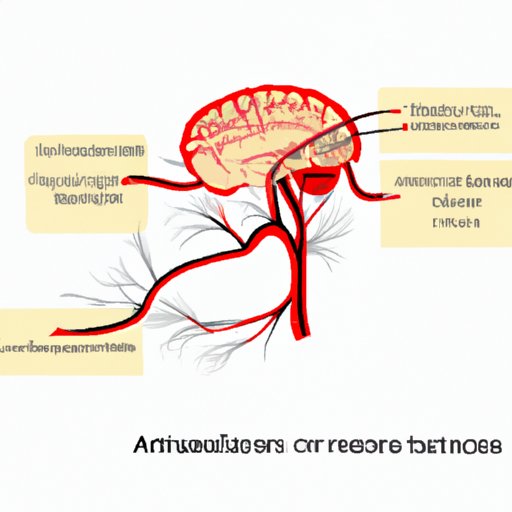Introduction
The brain is the most important organ in the body, controlling our senses, thoughts, and movements. It requires a constant supply of blood to transport oxygen and nutrients to its cells. Understanding the arteries that supply blood to the brain is crucial for maintaining brain health and preventing cognitive decline. In this article, we will explore the six crucial arteries that supply blood to the brain and discuss the impact of these arteries on cognitive health.
6 Crucial Arteries That Supply Blood to the Brain – An Overview
There are six crucial arteries that supply blood to the brain, including:
- The internal carotid arteries (ICA)
- The anterior cerebral arteries (ACA)
- The middle cerebral arteries (MCA)
- The posterior cerebral arteries (PCA)
- The basilar artery (BA)
- The vertebral arteries (VA)
Each of these arteries has a unique location and function in the brain, and any issues related to blood flow to these arteries can have a significant impact on cognitive health.
Why Knowing About Brain Arteries Can Save Lives – A Comprehensive Guide
Understanding the anatomy of the brain arteries is crucial for preventing and managing conditions related to cerebral blood flow. Conditions such as stroke, aneurysm, and atherosclerosis can affect the brain arteries, which can lead to cognitive decline and even death in some cases.
Stroke, in particular, is a leading cause of death and disability worldwide. It occurs when the blood flow to the brain is interrupted due to a clot or a ruptured blood vessel. Knowing about the brain arteries can help prevent stroke by identifying risk factors such as hypertension, diabetes, and high cholesterol. Early detection and management of these risk factors can prevent or reduce the risk of stroke.
Anatomy of Brain Arteries – A Visual Guide
The internal carotid arteries, anterior cerebral arteries, middle cerebral arteries, posterior cerebral arteries, basilar artery, and vertebral arteries all have a unique location and function in the brain. Together, they supply blood to the entire brain and are crucial for maintaining optimal cognitive function.
The internal carotid arteries are located in the neck and supply blood to the front of the brain. The anterior cerebral arteries supply blood to the front and top of the brain, while the middle cerebral arteries supply blood to the sides of the brain, including the areas responsible for movement and sensation.
The posterior cerebral arteries supply blood to the back of the brain, including the areas responsible for vision. The basilar artery is a large artery that forms at the base of the brain and supplies blood to the brainstem and cerebellum. The vertebral arteries supply blood to the back of the brainstem and the spinal cord.
Common Disorders Related to Brain Arteries and Their Impact on Cognitive Health
Several conditions can affect the brain arteries and impact cognitive health, including:
- Atherosclerosis
- Stroke
- Aneurysm
- Hypertension
- Diabetes
- High cholesterol
- Smoking
Atherosclerosis is a condition where the arteries become narrow due to the buildup of plaque. This condition can affect any of the brain arteries and can lead to a stroke or other complications. Stroke occurs when the blood flow to the brain is interrupted, which can lead to paralysis, speech difficulties, and even death.
Aneurysm is a condition where a weak spot in an artery balloons out and can rupture, leading to a hemorrhagic stroke in some cases. Hypertension, diabetes, and high cholesterol can all contribute to the development of these conditions and should be managed to prevent complications.
Smoking is also a significant risk factor for these conditions, and quitting smoking can help reduce the risk of stroke and other complications related to the brain arteries.
Brain Arteries and Lifestyle Choices – Tips for Maintaining Good Cerebral Blood Flow
Lifestyle choices such as exercise, diet, and stress management can all support brain artery health and promote optimal cerebral blood flow. Exercise can improve blood flow to the brain, while a healthy diet can help reduce the risk of atherosclerosis and other related conditions. Stress management techniques such as meditation and yoga can also help reduce the risk of hypertension and other stress-related conditions.
Other lifestyle choices, such as limiting alcohol intake and getting enough sleep, can also support optimal brain artery health.
Brain Arteries and Aging – How to Reduce Cognitive Decline
As we age, the blood vessels in the brain can become less elastic and more prone to damage. This can lead to atherosclerosis and other related conditions that can impact cognitive function. To reduce cognitive decline, it is essential to maintain good cerebral blood flow by following a healthy lifestyle and managing any related conditions such as hypertension or diabetes.
Regular exercise, a healthy diet, and stress management techniques can all support good brain artery health and promote optimal cognitive function as we age.
Conclusion
Understanding the importance of the brain arteries and how they impact cognitive health is crucial for maintaining optimal brain function throughout life. By taking steps to reduce risk factors for related conditions and following a healthy lifestyle, we can support good cerebral blood flow and promote optimal cognitive function.
Take charge of your brain health today and start living a healthier lifestyle to support good brain artery health.
